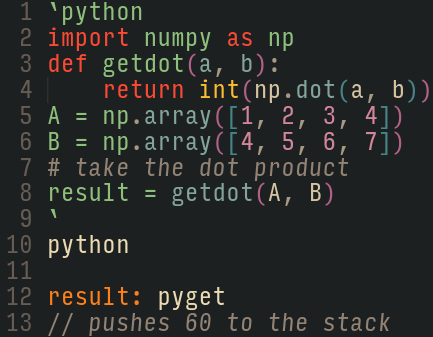Programming language glue.
https://github.com/flintwinters/Forj/tree/mainForj is like lisp but atoms are maps instead of linked list nodes.
This makes lisp a special case of Forj. Just give each atom a cons and car member.
It uses a stack based concatenative syntax.
Forj can mix source code from multiple languages.
The vscode plugin supports embedded syntax highlighting for python/c/shell/sql/markdown/json. These are interpreted as strings and can then be executed in their respective languages.

Checks whether an object is entirely of type int.
allints: @ [ int. map. and. reduce. ] def
Example usage:
@ [ 1 2 3 1 ] allints (Returns 1)
@ [ 1 2 3 "str" ] allints (Returns 0)